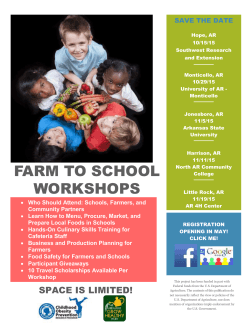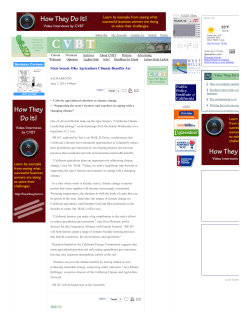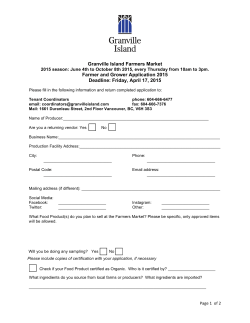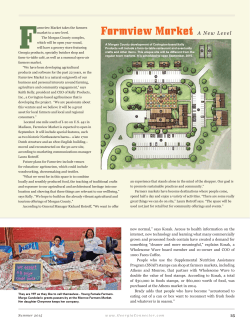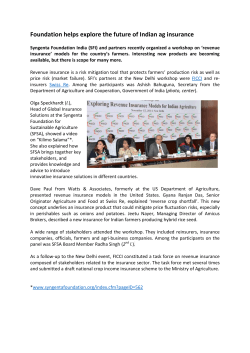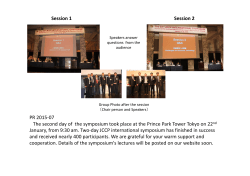
Women`s Land Rights and Access to Agri
w w Strategies including policies, technology and institutional innovations in these areas to strengthen women’s role in agriculture request in selected Hotels for which the participants should indicate their entitlements beforehand. Dee@keÀÌmeHeÀwce Fbef[³ee Gaps and research needs to improve access of women farmers to assets and services Important dates OXFAM Venue and Date Date of symposium : 23 -25 June 2015 Last date of submission of summary : 06 June 2015 Confirmation of acceptance of paper : 09 June 2015 The National Symposium will be held at ICAR-Central Institute for Women in Agriculture, Near Kalinga Studio, PO-Baramunda, Bhubaneswar-751003, Odisha on 23-25 June 2015. Organizing Committee: Organizers : ICAR- Central Institute for Women in Agriculture, Bhubaneswar Dr. S.K.Srivastava, Director(Acting), ICAR-CIWA and Oxfam India, Bhubaneswar Dr. Anil Kumar, Principal Scientist, ICAR-CIWA Participants Dr. Naresh Babu, Principal Scientist, ICAR-CIWA The symposium aims to bring together researchers, policy makers, development practitioners, NGOs and women farmers to share their experiences, innovations and findings on the women’s land rights and entitlements, access to and control over agri-resources in the context of women empowerment and higher and sustainable agriculture. Dr. Sabita Mishra, Principal Scientist, ICAR-CIWA Call for Papers Papers are invited from all the stakeholders in the above theme areas. Papers on concepts, experiences, empirical studies, action researches and evaluation studies focusing on specific topics may be submitted in the form of a summary in the range of 500-600 words. The summary should be submitted in MS word, Times New Roman font with font size 12, and it should convey a clear message about the issue being discussed, and include some facts and information for better understanding and clarity of the readers. A committee will screen the papers for oral and poster presentations, which will be communicated to the corresponding authors. The lead author should mention the theme area, title and authors with affiliations along with the text. The summaries will be published in the form of a compendium after suitable editing by an editorial board and will be released in the symposium. It is also planned to bring out a publication in book form with few selected good quality full papers for which authors of selected papers will be contacted. The summary of paper may be submitted through e-mail; nswl2015@gmail.com, hkdash_nrcwa@yahoo.co.in TA and DA for the Participants All the participants of the symposium have to bear their travel, boarding and lodging expenses. However, the accommodation for the participants may be arranged on Chair Ms. Ranjana Das, Programme Coordinator, OXFAM India YeekeÀDeveg = He ICAR National Symposium on Women's Land Rights and Access to Agri-resources & Services in Changing Development Scenario Sh. Pravas K.Mishra, Programme Officer, OXFAM Dr. H.K.Dash, Principal Scientist, ICAR-CIWA Dr. Jyoti Nayak, Senior Scientist, ICAR-CIWA Dr. Ananta Sarkar, Senior Scientist, ICAR-CIWA Mailing Address Dr. H.K.Dash, Organizing Secretary, ICAR-CIWA, PO-Baramunda ; Bhubaneswar751003, 0674-2386220; Mobile-09861170169 On 23-25 June 2015 at ICAR-Central Institute for Women in Agriculture (ICAR-CIWA), Bhubaneswar Dr. Ananta Sarkar, Joint Organizing Secretary, ICAR-CIWA, PO-Baramunda ; Bhubaneswar-751003, 0674-2386220; Mobile-09337116845 Dr. Jyoti Nayak, Joint Organizing Secretary, ICAR-CIWA, PO-Baramunda ; Bhubaneswar-751003, 0674-2386220 ;Mobile -09437081238 For further Information: Director, ICAR-CIWA, Near Kalinga Studio, PO-Baramunda, Bhubaneswar751003, 0674-2386220, Oxfam India, D 22 Maitri Vihar, Chandrasekharpur, Bhubaneswar 751016, 06742303992/93/94 Organized by ICAR-CIWA, Bhubaneswar & Oxfam India, Bhubaneswar control over agri-resources and implications for agricultural growth Introduction According to Census of India 2011, 65.5% of economically active women in India are engaged in agriculture constituting about 37% of the total agricultural work force. Notwithstanding the gradual decline in the proportion of women workers in agriculture, the absolute number of women farmers in India has increased by about 62 million during 2001 and 2011. Therefore, the role of women in agriculture assumes considerable significance in the overall context of economic development. Moreover, women’s role in agriculture is poised for a greater change in view of the impending as well as emerging challenges and opportunities in agriculture. Therefore, recognizing women as an important human resource for agriculture and empowering them with due rights and entitlements form the core strategy for achieving higher, sustainable and inclusive agricultural growth. But the question remains, how to empower women when the available statistics speak volume of the poor condition of women farmers worldwide. They have less access than men to agriculture related assets, inputs and services. For example, only five per cent of current agricultural extension efforts and resources are directed to women and they invariably earn far lower wages than men for equivalent work. Had they enjoyed the same access to productive resources as men, women could boost yield by 20-30 %; raising the overall agricultural output in developing countries by two and a half to four per cent. This gain in production could lessen the number of hungry people in the world by 12-17%, besides increasing women’s income (FAO, 2011). While we talk of empowerment of women in agriculture, the discussion invariably focuses around access to and control of women over productive assets and their effective use for sustainable livelihood and income. Therefore, securing property rights including the land rights for women and providing them access to different agri-extension services and markets would go a long way in improving the status of women farmers. This, in turn, would make Indian agriculture more sustainable. It is, therefore, timely to undertake an exercise to assess the situation in respect of women rights, access and control in agriculture by drawing upon evidences and lessons from different parts of the country which might be useful in charting out more appropriate course of action for empowering women in agriculture. Against this backdrop, a National Symposium on Women’s Land Rights, Access to Agri-resources and Services in Changing Development Scenario’ is being organized by ICAR-Central Institute for Women in Agriculture (CIWA)and Oxfam India with the participation of researchers, policy makers, development practitioners and women farmers from different parts of the country. Objectives w To discuss the current scenario of women’s land rights in agriculture w To deliberate the constraints that women farmers are facing in access to and w w Effective delivery of extension services is critical for successful transfer of technology. In the process, women can never be ignored as they have an important stake in changing context. But traditionally, our extension system has not been gender sensitive, notwithstanding the changing approaches to reach out to women. As a result, there exists a considerable gender gap in access to extension services which has deprived women of available scientific and technological knowhow in agriculture. Similarly, constraints in getting suitable markets for a remunerative price of their produces very often compel women farmers to sell their produces with either very little or no margin. In such a scenario, it is important to understand how the present extension system is serving the farmers, particularly the women farmers; what constraints women face in accessing the extension services; and what kind of innovations may be required to reduce the gender gap. Similarly, linking women farmers to markets is a great challenge. What are the market related constraints and how these deter women farmers from producing at an optimum scale and with better technology are topics for discussion. Other topics such as marketing channels/practices adopted by women to dispose off their produces may also be studied. To share evidences and experiences on various aspects of women’s entitlements in agriculture under different policies and programmes Symposium Themes w Status of women’s land rights in India and intra-household decision making Dearth of reliable data on women’s rights on various resources is a serious constraint in proper assessment of women’s status in agriculture. It is also true that the subordinate position of women in our society has its root in gender inequality in the rights over productive resources like land which limits the participation of women in decision making process both at household and community level. Therefore, it is imperative to understand the issues in proper perspective based on reliable data so as to develop appropriate interventions for empowerment of women. Under the proposed theme, the contributors may focus on the extent and type of ownership and access of women, the practices and challenges in getting land rights and the participation of women in different areas of decision making. w Women’s land rights, technology adoption and food security w The votaries of land rights for women argue that lack of control over assets such as land is one of the reasons for low productivity of women. Hence, how ensuring land rights to women influences technology adoption in the field and what are its implications for household and community level food security including other development outcome are certainly areas worth exploring. w Women’s access to credit and agri-inputs Timely access to credit and quality agri-inputs has a significant bearing on production and profitability of farmers. Due to many structural and functional bottlenecks, farmers fail to get timely access to credit and inputs. No doubt, over years a number of initiatives have been taken for financial inclusion of poor, particularly women. Micro credit for women SHGs is one such potent financial scheme that has to a large extent freed women and their family from clutches of money lenders. On the other hand, not much has changed on agriinput front. Farmers as well as women farmers still suffer from non-availability of quality inputs that has an adverse effect on production. Under the theme, issues like extent of credit availability to women, its utilization pattern, impact on production and livelihood, constraints in access to agri-inputs and its implications and some case studies on innovations to overcome the problem may be studied. Policies and institutional mechanisms to improve women’s access to land, other resources and their impact on livelihood and agriculture A number of policies and institutional mechanisms are being implemented to empower women by giving them entitlements over land, water and other common property resources. Even policies are being mooted to influence the land rights pattern by incentivizing the transfer of property rights to women. What are these policies and institutions and how these have affected the livelihood of women and their families and impacted agricultural production and productivity. Scope and limitations of such polices need to be studied and Case studies from different parts of the country would certainly provide good insights into linkages between policies/institutions and agricultural development through women empowerment. Extension services and market linkages for women farmers In addition, an exhibition will be organized to showcase the achievements of Women Self Help Groups and organizations working for empowerment of women in agriculture. Expected Outcomes w New knowledge and experiences from across the country on women’s rights and entitlements in agriculture
© Copyright 2025
